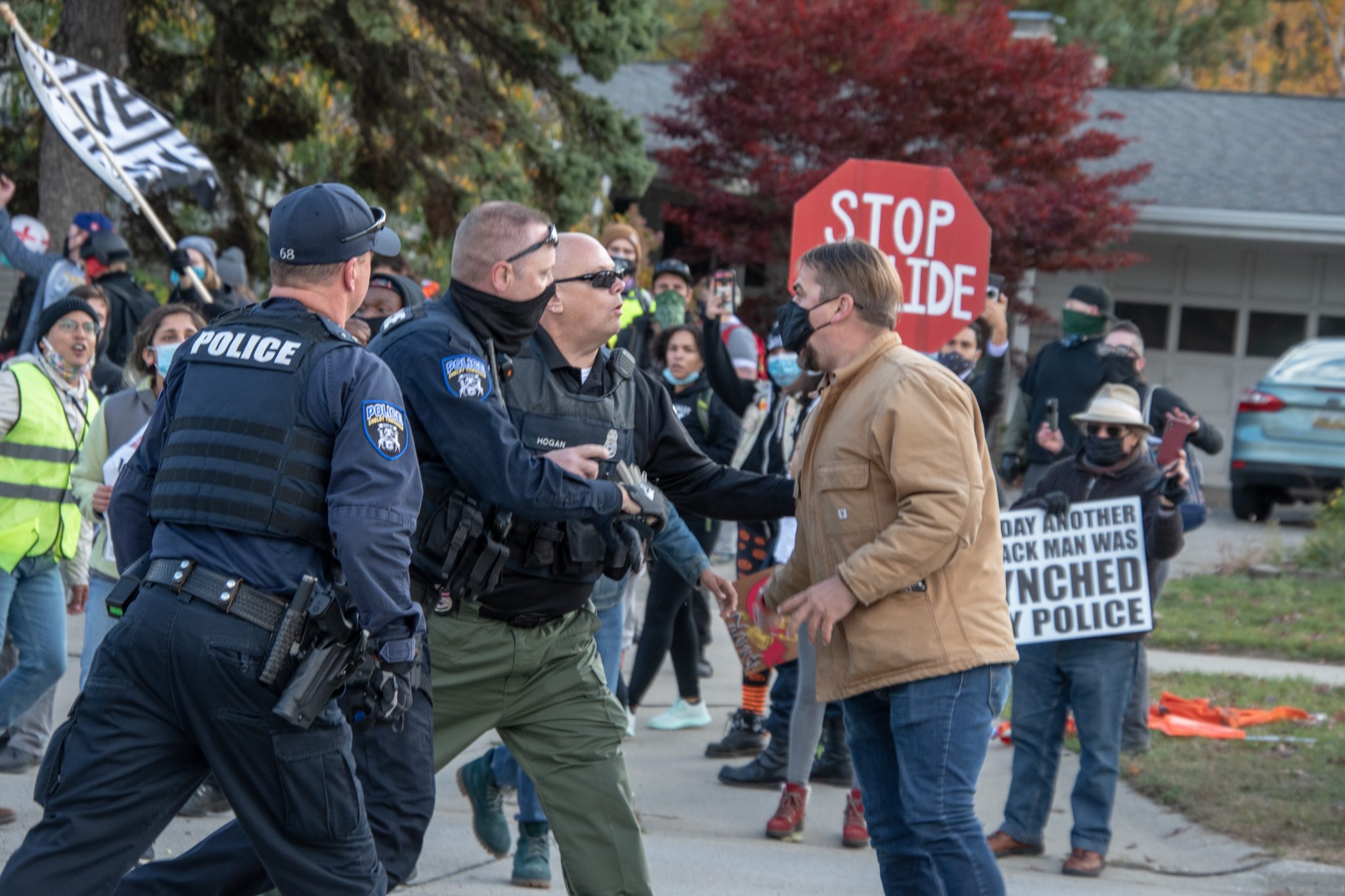The Combustible Mix of White Rage, Racial Injustice and the Election
A rise in anger and awareness over the police killings of Black men combined with an upsurge in the participation of militia groups have already led to confrontations and violence. What will happen after the election?

The partisan divide has grown wider over the past four years and the threat of political unrest continues to grow. A rise in anger and awareness over the police killings of Black men combined with an upsurge in the participation of militia groups have already led to confrontations and violence.
Frustration, injustice, and politics make for unstable chemistry.
“I would not at all be surprised to see some outbursts of violence around the election if Biden wins, or especially if we don’t have a clear result election night or for several days after.” — Dr. Amy Cooter, Vanderbilt University
“I think that what we’re seeing now is the combination of the COVID-19 pandemic, racialized violence that we’ve seen since forever, and politics and things like that. I think that kind of creates a brew that really puts people on edge,” says Chad King with Detroit’s Black Bottom Gun Club. Membership in the group has grown substantially this year, despite the pandemic.
Listen: WDET’s Russ McNamara examines the how and why of potential post-election turmoil
2020 has already seen great numbers of people in the streets protesting systemic racism and injustice.
“By and large, African Americans, when we do protest is not necessarily violent. You have agent provocateurs, coming from outside of black spaces and doing things like that, like we saw with the folks who burned down the precinct in Minneapolis,” King says.
Recently, a Texas man who supports the predominantly white “Boogaloo Boys” was charged with inciting a riot and firing his gun into a Minneapolis police precinct during protests there in May.
The Southern Poverty Law Center tracks extremism and says the objective of the Boogaloo movement is “for society (to) descend into chaos so that they can come to power and build a new fascist state.”
“I believe that obviously, it’s always the case that violence is going to be at the top of the list in terms of what’s most disruptive. But when we look at what is a close second and what can contribute to violence, certainly disinformation has risen to the top and is one of the most important tools that these groups use to sow discord in this country,” says Professor of National Security Communication at Michigan State University, Shawn Turner.
Donald Trump has only added to that problem. The Washington Post reports that the president has made over 22,000 misleading claims while in office.
“These groups don’t want to be ignored. When they take up arms and they go and they stand in front of the Capitol Building when they marched through the streets espousing these views, they want the attention, and part of the way they get that attention is by engaging in misinformation and disinformation prior to those events,” says Turner.
White Anxiety Leads to Voter Intimidation Concerns
It’s not a surprise to experts that the protesters against Governor Gretchen Whitmer’s COVID-19 executive orders showed up armed.
“The commonality across all militia groups is this idea that they feel it is their responsibility to watch out for government overreach. Trying to make this argument effectively that the Second Amendment is what allows for the First Amendment allows for the average everyday citizen to remind the government that they’re there to represent them,” says Dr. Amy Cooter, a senior lecturer in sociology at Vanderbilt and an expert in what makes militia members tick.
With President Trump making baseless claims about voter fraud, the upcoming election has only added to the fears of white men.
“A lot of these folks have had anxiety for quite a while, even before the pandemic, about this upcoming presidential election, perceptions that it would not be fair that somehow Trump would be basically screwed out of a chance to have an opportunity to be fairly re-elected,” Cooter says.
That anxiety has led to fears about militia groups showing up at the polls to discourage turnout. Despite concerns, Black voters in Detroit remain committed to exercising their right to vote.
“This is no game and we are not playing. We have determined that everyone who seeks access to the voting booth is afforded the opportunity without intimidation, interference or harassment at the polls,” says Reverend Wendell Anthony President of the Detroit Chapter of the NAACP.
The Detroit Chapter of the NAACP will have people at the polls monitoring for threats and have set up a hotline to report intimidation.
Still, anxiety remains for the possibility of unrest in the days and weeks following Election Day, but not all unrest is bad for the country.
“We do not want to stop people from engaging in civil disobedience and in civil dissent.” – Wayne State Professor Ron Brown

“The best-case scenario is to see civil disorder as part of the democratic process and that there are boundaries and that we do not want to stop people from engaging in civil disobedience and in civil dissent. The only time we should arrest people is if they threaten the security of the state. And Black Lives Matters groups are not threatening the security of the state – they’re asking for reform,” says Ron Brown, an associate professor of political science at Wayne State University.
Protests by racial justice groups have drawn counter-protests from right-wing militia and white nationalist groups and that can present a problem for authorities.
“You will probably see the police put both groups in jail. However, I think that that the vast majority of those must be again those on the right because they are the ones who are disruptive. They are the ones that are largely a threat to democratic norms,” Brown says.
Police are Part of the Problem
Civil unrest over the summer months has reaffirmed that relying on law enforcement can be problematic.
“There has existed a special relationship between some arms of law enforcement and militia groups.” — Shawn Turner, Michigan State University
Recently, police in Kenosha, Wisconsin were seen passing out water and offering support to armed white men shortly before a white teenager from Illinois killed two Black Lives Matter protesters and shot another.
“There has existed a special relationship between some arms of law enforcement and militia groups,” say Shawn Turner. “We go back and we look at what happened in Kenosha, Wisconsin, and we’ve all seen the stories of law enforcement saying we’re glad you’re here and standing shoulder to shoulder with the groups that showed up and we’ve seen that in other states.”
There’s plenty of concern that some sort of violence might be unavoidable.
“I would not at all be surprised to see some outbursts of violence around the election if Biden wins, or especially if we don’t have a clear result election night or for several days after,” says Cooter.
Since George Floyd was killed by a police officer last May, protesters have been on the streets in major cities across the country every single day. The FBI Director, Christopher Wray says right-wing terrorism and white supremacists make up the biggest threat to this country.
With this combustible mix, only time will tell whether this election will be the first step towards healing or the spark that sets it ablaze.
Trusted, accurate, up-to-date
WDET is here to keep you informed on essential information, news and resources related to COVID-19.
This is a stressful, insecure time for many. So it’s more important than ever for you, our listeners and readers, who are able to donate to keep supporting WDET’s mission. Please make a gift today.

